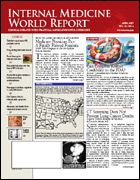Publication
Article
Internal Medicine World Report
Inhaled Insulin Contraindicated in Many Patients
Author(s):
Use Spirometry Findings, Smoking History to Determine Eligibility
About 40% of patients with type 1 or type 2 diabetes should not use inhaled insulin (Exubera), and this proportion would increase to 65% over 7 years in those with type 2 diabetes.
Diabetes Care
This finding comes from a new study published in (2007; 30: 360-361) that sought to determine how many patients with diabetes would be poor candidates for starting or continuing inhaled insulin therapy, based on the manufacturer’s prescribing recommendations:
• Do not use in patients with a forced expiratory volume in 1 second (FEV1) <70% of predicted for age, sex, and height
• Do not use in current smokers or smokers who have quit < 6 months earlier
• Do not use in patients with unstable or poorly controlled lung disease
• Discontinue therapy if FEV1 declines ≥20%.
Investigators used data from longitudinal, observational Fremantle Diabetes Study participants for whom spirometry readings were available.
Applying the inhaled insulin contraindications to the 70 patients with type 1 diabetes (mean age, 43.8 years; mean diabetes duration, 12.8 years) would exclude 16 smokers and 7 nonsmokers with FEV1 <70%, and 4 other patients with self-reported chronic respiratory disease, leaving 61% eligible for therapy.
Spirometry data were available for 107 patients with type 2 diabetes (mean age, 61.7 years; mean diabetes duration, 2.6 years). In 12.5% of these, baseline FEV1 of >70% decreased during the 7 years of follow-up; in another 17.3%, FEV1 decreased by >20%.
By assuming a stable number of smokers and patients with chronic respiratory disease, the authors estimated that the proportion of type 2 diabetes patients that would be ineligible for inhaled insulin would increase from 35% to 65% over 7 years.
The findings that a significant number of patients would be ineligible for inhaled insulin—and that this proportion would double in the subsequent 7 years among those who were initially eligible—underscores the need to carefully follow recommended monitoring procedures when considering inhaled insulin. All patients should undergo spirometry at baseline, again at 6 months after starting therapy, and then at least once yearly thereafter.





